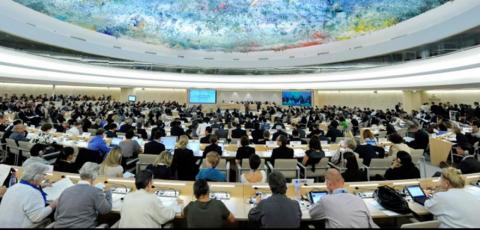
On 19 April 2021, Alkarama was informed that the Working Group on Situations of the Human Rights Council (HRC) complaint procedure(*) decided to dismiss our communication on Saudi Arabia. Pending since 2016, our complaint documented gross human rights violations committed by the Saudi authorities, focusing on the systematic arbitrary detention of peaceful dissidents, including following unfair trials before the Specialised Criminal Court.
We are appalled by this decision not to refer the matter for consideration by the HRC, which we believe contributes to a pervasive climate of impunity with which the Saudi authorities continue to act. It is an affront to the many victims of abuses in Saudi Arabia and goes against the spirit of complaint procedure of the Human Rights Council, which should be holding states accountable for gross human rights violations.
As such, we decided to publish our response to the Working Group on Situations below, as well as our initial complaint.
--
Copy to: UN High Commissioner for Human Rights; OHCHR Chief of Asia-Pacific; OHCHR Chief of MENA; Permanent Missions of Germany, Uruguay, Cameroon, Philippines; Presidency of the Human Rights Council.
Re: Our comments to your decision to dismiss our communication on Saudi Arabia
Dear Members of the Human Rights Council’s Working Group on Situations,
We would like to express our utmost concern over your recent decision to discontinue the consideration of our communication 228 concerning Saudi Arabia. We are appalled by this decision, which has additionally not been motivated, for the following reasons:
On the merits of our communication:
We recall that in our initial communication of 8 February 2016, we argued that security forces acting under the authority of the Ministry of Interior were responsible for the arbitrary arrests of numerous individuals for exercising their fundamental rights and freedoms, including freedom of expression, peaceful assembly, and association. We identified a pattern of arbitrary detention of peaceful dissidents, including following grossly unfair trials before the Specialised Criminal Court, and based on a flawed and repressive legal framework, and provided testimonies.
After the Working Group on Communications considered our communication to be admissible and transmitted it to the Working Group on Situations in February 2017, we provided four follow-up communications providing additional elements and updates on cases included in the initial complaint.
Our communication, which concisely demonstrated consistent patterns of gross human rights violations, were not only supported by several thoroughly documented cases, but also by concurring information from other United Nations human rights bodies, including the High Commissioner for Human Rights, the UN Committee against Torture, and UN Special Procedures.
As you are also aware, two joint statements were delivered by Member States of the Human Rights Council during its 40th and 45th session, respectively. The statements denounced, among others, the gross patterns of human rights abuses highlighted in our communication, including continuing arrest and arbitrary detention of human rights defenders, as well as the use of counter-terrorism law and other security provisions against individuals peacefully exercising their rights.
Today, the consistent pattern of human rights violations committed by the Saudi authorities has been consistently documented and widely denounced by the international community.
By dismissing our communication, we understand that you have not found the Saudi authorities to be responsible for gross violations of human rights and fundamental freedoms. This is not only erroneous, but goes against the findings of civil society organisations, the High Commissioner for Human Rights and UN human rights mechanisms, several UN Member States as well as the European Parliament.
On the procedural aspect:
We reiterate our utmost concern that your decision to dismiss our communication was not motivated. In addition, throughout the procedure, we received no information whatsoever except from succinct letters stating that our complaint was “considered” and that your Group decided to “keep the matter under further review” and “request for additional information from the Government of Saudi Arabia”.
We wish to highlight that we have always cooperated in good faith with the Complaint Procedure. Among others, we respected the confidentially request throughout and submitted follow-up information. However, and despite our repeated attempts, communication with the Secretariat of the Complaint Procedure was scarce throughout the four years that our complaint was pending before the Working Group on Situations.
In light of the above, we are alarmed by the opacity and lack of transparency of the Human Rights Council Procedure. Our concerns do not only stem from the treatment of our communication on Saudi Arabia, but also from the dismissal of two other complaints on other countries, which similarly highlighted evident and consistent patterns of human rights abuses. These other complaints, which were well-founded and thoroughly documented, were also summarily dismissed, without any justification.
Alkarama had previously unsuccessfully engaged with the 1503 procedure of the Human Rights Council, which we found to be opaque and ineffective. However, in 2007, when it was replaced by the procedure under Human Rights Council 5/1, we hoped this mechanism would constitute a mean to hold perpetrators of gross human rights abuses accountable. You stated that the new procedure aimed at achieving “greater transparency” and having a more “victims-oriented approach”.
Today, we believe your Complaint Procedure has failed to fulfil its purpose. Your inaction and refusal to transmit the situation in Saudi Arabia to the Human Rights Council contributes to a pervasive climate of impunity with which the authorities continue to act. It is not only an affront to the many victims of abuses in Saudi Arabia, including those whose testimony we provided, but goes against the spirit of the complaint procedure of the Human Rights Council that was reformed in 2007.
Respectfully,
Alkarama.
(*) The HRC complaint procedure was established in 2007 to address consistent patterns of gross and reliably attested violations of all human rights and fundamental freedoms. The Working Group on Situations can bring such matters to the attention of the HRC for consideration. In 2021, the membership is composed of the Ambassadors for the Philippines, Cameroon, Uruguay, and Germany.
